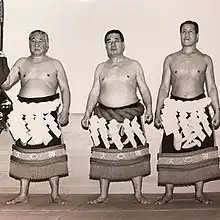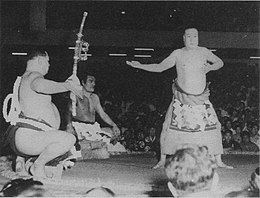Kanreki dohyō-iri
In sumo wrestling, a kanreki dohyō-iri (Japanese: 還暦土俵入り) is a ring-entering ceremony (dohyō-iri) performed by a former yokozuna in celebration of his 60th birthday (called kanreki in Japanese). If he is a toshiyori (a sumo elder), the ceremony is usually held at the Ryōgoku Kokugikan, the main sumo hall in Tokyo. Those who are not current members of the Japan Sumo Association must hold it at another location.[1] A special red tsuna is created and worn, instead of the usual white tsuna.[1] Reaching your 60th birthday is an important occasion in Japan and is celebrated by wearing a red item. This is commonly known as an akatsuna (赤綱) but this term is unofficial. If the dew-sweeper or sword-bearer is a former yokozuna, he wears his own tsuna.[2]

History
The first kanreki dohyō-iri was originally held to celebrate the achievements of legendary yokozuna Tachiyama, who had recorded just three defeats since his promotion to the supreme title of yokozuna, on the occasion of his sixtieth anniversary. The ceremony took place at the Ueno Seiyōken, a renowned French cuisine restaurant in Tsukiji (Chūō, Tokyo).[3] The Tachiyama-kai (太刀山会), the yokozuna's supporters association (koenkai) when he was still active, organized a 300-cover banquet for the event, attended by, among others, Tōyama Mitsuru and Saigō Jūtoku, two influential members of the nobility to whom the Japan Sumo Association owed much of its influence.[3]
Kanreki performed at Kokugikan

Wrestlers are listed using their ring name, followed by their then toshiyori name in brackets if they were retired at the time of the ceremony.
| Year | Wrestler | Dew-sweeper | Sword-bearer |
|---|---|---|---|
| 1952 | Tochigiyama Moriya (Kasugano) | Akinoumi Setsuo (Fujishima) | Haguroyama Masaji (active) |
| 1956 | Tsunenohana Kan'ichi (Dewanoumi) | Chiyonoyama Masanobu (active) | Futabayama Sadaji (Tokitsukaze) |
| 1985 | Tochinishiki Kiyotaka (Kasugano) | Sadanoyama Shinmatsu (Dewanoumi) | Wakanohana Kanji I (Futagoyama) |
| 1988 | Wakanohana Kanji I (Futagoyama) | Takanosato Toshihide (Naruto) | Wakanohana Kanji II (Magaki) |
| 2000 | Taihō Kōki (special toshiyori)[1] | Chiyonofuji Mitsugu (Kokonoe)[1] | Kitanoumi Toshimitsu (special toshiyori)[1] |
| 2013 | Kitanoumi Toshimitsu (special toshiyori)[4] | Takanohana Kōji (special toshiyori) | Chiyonofuji Mitsugu (Kokonoe) |
| 2015 | Chiyonofuji Mitsugu (Kokonoe) | Harumafuji Kōhei (active) | Hakuhō Shō (active) |
| 2021 | Asahifuji Seiya (Isegahama)[5] | Aminishiki Ryūji (Ajigawa)[5] | Harumafuji Kōhei (No longer in Sumo Association)[5] |
| 2023 | Hokutoumi Nobuyoshi (Hakkaku)[6] | Hokutofuji Daiki (active)[6] | Okinoumi Ayumi (Kimigahama)[6] |
Kanreki performed at other locations
| Year | Wrestler | Dew-sweeper | Sword-bearer | Venue |
|---|---|---|---|---|
| 1937 | Tachiyama Mineemon | Tachienoumi Namiemon (Kise) | Tachihikari Den'emon (Naruto) | Ueno Seiyōken restaurant |
| 2002 | Kitanofuji Katsuaki[1] | Hokutoumi Nobuyoshi (Hakkaku)[1] | Chiyonofuji Mitsugu (Kokonoe)[1] | Hakkaku stable and Hotel East 21[1] |
| 2007 | Mienoumi Tsuyoshi (Musashigawa)[1] | Miyabiyama Tetsushi (active)[1] | Dejima Takeharu (active)[1] | Hotel Grand Pacific Meridian[7] |
Tachiyama's was the first kanreki-dohyo-iri and the only one to use the shiranui style until Asahifuji's in 2021. Mienoumi performed an early kanreki dohyō-iri seven months before his 60th birthday, on the 25th anniversary of the founding of Musashigawa stable.
Other eligible Yokozuna
Minanogawa Tōzō, Akinoumi Setsuo and Hiroshi Wajima also reached the age of sixty years whilst retired, but did not perform a kanreki dohyō-iri (all three had left the sumo world many years before). Kagamisato Kiyoji (Tatsutagawa), Tochinoumi Teruyoshi (Kasugano), Sadanoyama Shinmatsu (Sakaigawa) and Kotozakura Masakatsu (Sadogatake) received red tsuna but did not perform dohyō-iri. Kagamisato and Kotozakura did not perform due to poor health. Similarly Tochinoumi did not perform due to muscle problems in his right arm dating back to his active days. Sadanoyama declined because at the time he had just lost the chairmanship of the Sumo Association in controversial circumstances. Asashio Tarō (Takasago) had a red tsuna made, but died aged 58 without performing the ceremony.
Asahifuji was scheduled to perform the kanreki ceremony on 30 May 2020 but the event was postponed owing to the COVID-19 Pandemic.[1] It was eventually held on 3 October 2021 at the Kokugikan.[5]
Ōnokuni Yasushi reached 60 years of age in October of 2022, however, no plans for a dohyō-iri were reported.
See also
References
- "Sumo's unique kanreki ceremonies provide windows into past". Japan Times. 8 July 2020. Retrieved 8 July 2020.
- Hall, Mina (1997). The Big Book of Sumo (Paperback). Berkeley, CA, USA: Stone Bridge Press. p. 89. ISBN 1-880656-28-0.
- "【ベテラン記者コラム(495)】元横綱にだけ許される還暦土俵入り 60歳の体と審美性". Sankei Sports (in Japanese). 31 August 2023. Retrieved 1 September 2023.
- 北の湖が還暦土俵入り 理事長在任中では25年ぶり. Nikkei Sangyo Shimbun (in Japanese). 9 June 2013. Retrieved 13 August 2013.
- 伊勢ケ浜親方が還暦土俵入り「ここまでやってきて良かった」元日馬富士が太刀持ち. Daily Sports (in Japanese). 3 October 2021. Archived from the original on 4 October 2021. Retrieved 3 October 2021.
- "八角理事長9月に両国国技館で還暦土俵入り「しなびた体だけど、私も一肌脱がないと(笑い)」". Nikkan Sports. 22 June 2023. Retrieved 22 June 2023.
- 武蔵川親方が土俵入り 来年2月で還暦に. 47NEWS (in Japanese). 2007-06-16. Retrieved 2012-10-02.
External links
- Article with images of kanreki dohyō-iri (Japanese) (retrieved via Wayback Machine)